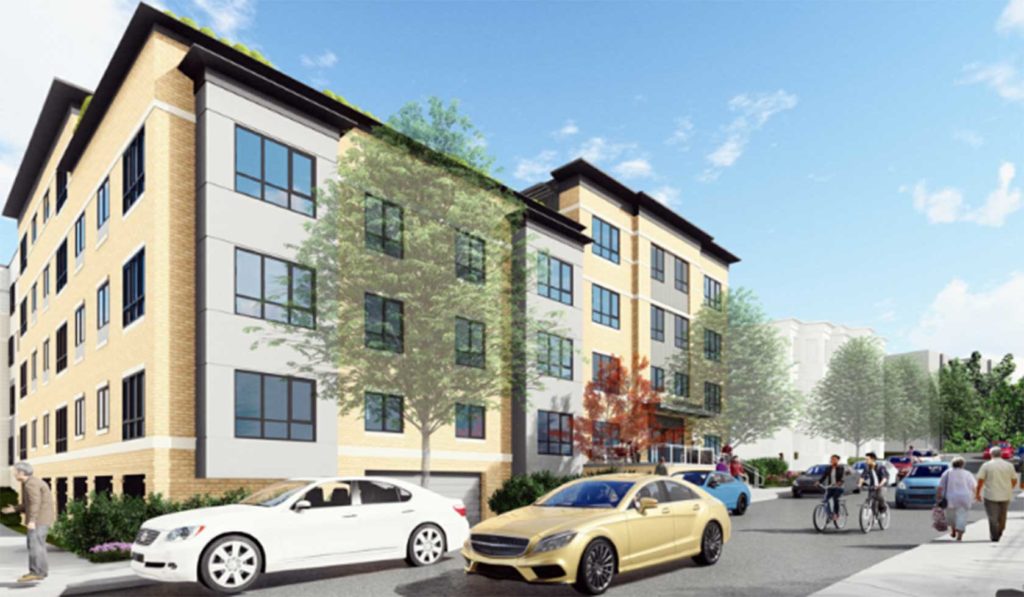JPNDC project stirs community opposition
Abutters raise parking, density concerns over 74-unit project

As plans to develop housing for seniors and families on Cheney Street in Grove Hall move forward, some residents continue to express concerns about the impact of the new properties on the neighborhood.
Planned for the site of a former automotive garage, the project is being carried out by the nonprofit Jamaica Plain Neighborhood Development Corporation (JPNDC), and includes 59 affordable rental units for seniors in one building, and 15 affordable homeownership units across two additional buildings.
JPNDC is also boasting access for seniors to an onsite Program of All-inclusive Care for the Elderly (PACE) alternative care center that will offer clinical services to any neighborhood resident who chooses to enroll.
“The opportunity to not only allow our seniors to age in dignity in their community, but also to do that in an enhanced, supportive environment is really critical,” JPNDC CEO Teronda Ellis said.
Ellis also said the project is in the public interest as the city continues to struggle with access to affordable senior living.
In addition to PACE and relative proximity to several hospitals and health centers, other amenities include a rooftop space, courtyard green space designed for programming, a community room and free Wi-Fi for all residents.
The senior units are being offered to households whose incomes are 30%, 50% and 60% of the area median income (AMI). The homeownership units are planned to be offered for those at 80-100% AMI.
JPNDC, after first proposing its plan in September of 2020 and holding a public meeting with the Boston Planning and Development Agency (BPDA) over the summer, received board approval in September 2021.
Despite the benefits JPNDC says it’s bringing to Grove Hall, concerns remain about the scale of the project and a lack of communication with local residents.
Michael Kozu, co-director of Project R.I.G.H.T (Rebuild and Improve Grove Hall Together), said despite initial interest in collaborating with neighborhood groups and residents, the collaboration with JPNDC has significantly fallen off since the BPDA project approval.
He compared the situation to a 2017 dispute between the city’s Department of Neighborhood Development and Roxbury’s Garrison-Trotter Neighborhood Association during which initial agreements to discuss development options were turned into development plans without GTNA’s consent.
“They start the process with them, and then they stop it and then they try to push their application to the zoning board,” Kozu said.
Kozu added during a conversation with the Banner that the project presents “clear traffic and parking issues” by including more homeownership units than requested by residents, with parking located far away from units, leading occupants to having to walk several hundred feet. Kozu said this, coupled with the sheer density of a four-and-a-half-story building and a history of public safety issues in the area, will lead to fights for street spots outside the proposed homes and increased congestion on already tight roads.
“We already have too many homeowners and tenants who have actually left because they cannot deal with existing conditions that are there,” Kozu said. “And they’re going to pack in even more people in an unbearable situation. There has to be a much-scaled-down version of what they’re proposing for it to work.”
In a written statement, JPNDC said that like their neighbors, they would prefer parking directly next to the home ownership units, and that it is still a goal they are working towards in their final designs.
“The City of Boston, a critical funder for the project, required JPNDC to move parking for the homeownership units at 20-28 Cheney to the midrise building in order to maximize backyard green space,” a statement from a JPNDC representative reads. “We are continuing to work with the City in hopes of reducing the number of homeownership units on Cheney Street, so that we can provide parking adjacent to those units.”
The statement goes on to say that parking for the apartment building itself is still “entirely accessible,” with a fully covered lot and elevator access into the building.
Another concern, Kozu said, was that the project proposal changed between the community meeting and BPDA submission — that it was reverted back to the original proposal that provoked complaints.
In response, the JPNDC spokesperson wrote, “At the community meeting JPNDC hosted on April 21, 2021, we presented changes in the project plan that were required by the Mayor’s Office and the BPDA: an addition of six homeownership units to the original nine, in order to maximize affordable homeownership opportunities for Boston families. We didn’t have updated drawings at that point but shared the updated drawings showing 15 homeownership units with the neighborhood association on June 13. The plans presented at the Article 80 meetings in July 2021 reflected the updated unit mix. The plan has not changed since.”
Ellis said she thinks miscommunication is at the heart of the community’s resistance to the project, and that JPNDC will continue to host informational sessions as the process continues.
“We’re a community organization that is happy to have ongoing dialogue with anyone, even if we’re not in agreement. And so we’ve made our team available through various platforms, both email and Zoom, and we’ll continue to have those conversations,” she said.
Kozu and concerned abutters hope their questions can be taken seriously, and that the neighborhood is given some agency in how JPNDC ends up implementing its plan.
“What’s been presented by JPNDC is one sided — they only present a small part of the picture. They don’t really talk about the full impact of what their proposal is,” Kozu said
He added, “They would not do what they’re doing in JP — bypassing existing neighborhood associations and neighbor groups that they feel that in Grove Hall and Roxbury that they can.”
Finalized construction plans are expected by Summer 2022. It’s unclear when future community meetings regarding the project will occur.






